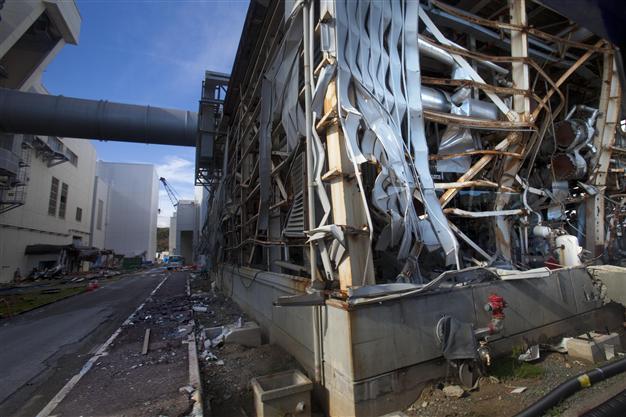Japan faces nuclear-free summer, power shortage risks
TOKYO - Reuters

In this Nov. 12, 2011 file photo, the crippled Fukushima Dai-ichi nuclear power station is seen through a bus window in Okuma, Japan, as the media were allowed into Japan's tsunami-damaged nuclear power plant for the first time since the March 11 disaster. AP photo
The possibility of a nuclear power-free summer in Japan draws closer when one of two remaining reactors shuts down for on Monday for maintenance, raising concerns about a power crunch if none of those taken off-line after the Fukushima crisis is restarted.Anti-nuclear activists may applaud the prospect that the reactors that supplied nearly 30 percent of Japan's electricity before the March 2011 disaster will be shut down. But experts say firms will have to bear a costly burden and that mandatory limits on power use may be necessary to avoid blackouts.
Tokyo Electric Power Co, the operator of the Fukushima plant, will shut down its last running reactor, the No. 6 unit at the Kashiwazaki Kariwa plant, leaving online just one of Japan's 54 reactors.
The one remaining reactor, Hokkaido Electric's Tomari No.3, is scheduled to go off line on May 5 for maintenance, the Yomiuri newspaper reported on Sunday.
Safety worries have kept reactors that underwent regular maintenance from going back on stream after the Fukushima disaster, triggered by a huge tsunami last March. Tens of thousands evacuated their homes.
The government is keen to get some running again, but must first persuade wary locals that the plants are safe.
Most mayors and governors whose communities host nuclear plants want fresh safety assurances beyond the government-imposed stress tests conducted in recent months before agreeing to the restart of reactors, a Reuters poll showed.
Utilities have pressed into service old fossil fuel plants to boost power supply. But analysts said these ageing facilities could suffer breakdowns, while companies and vulnerable consumer groups would also have to bear the pain of adjustments.
"It's tough...We may see a big impact on industrial activities this year," said Osamu Fujisawa, an independent energy economist. "It's likely for two or three reactors to come back online, but that is a drop in the bucket."
The government has estimated that Japan could face a power shortage of 9.2 percent this summer, or 16.6 million kilowatts, if all nuclear reactors are down and no measures are taken.
But it also said most of that gap could be filled if steps such as increasing power supply from fossil fuel plants and solar power as well as conserving energy are taken.
RISKS, COSTLY STEPS
Last summer, the government imposed power restrictions on some large corporate users, ordering them to cut usage by 15 percent.
To deal with the shortage, manufacturers operated plants at night and on the weekends to avoid peak hour power consumption. Companies used in-house generators while cutting down on the use of air conditioners and lights.
Such steps, while effective, came with costs.
A poll by business lobby Keidanren in October showed most of 53 manufacturers surveyed said it was hard to operate plants at non-peak hours due to high costs and the burden on employees. Only one manufacturer was willing to take such steps again.
"Many companies, especially manufacturers, are saying that if such a situation continues for two or three more years, then they would have to go abroad," Keidanren official Masami Hasegawa told Reuters.
Installing in-house generators is expensive.
"The worst scenario for companies would be to install in-house generators at a high cost and taking a very long time for investment payback," said Hirofumi Kawachi, a senior analyst at Mizuho Investors Securities.
Trade Minister Yukio Edano, who oversees energy policy, said on Friday that Japan might manage to get through this summer without mandatory power use restrictions.
But Fujisawa, the independent energy economist, warned that the region served by Kansai Electric, which includes the huge western metropolitan area of Osaka, may face mandatory limits because of Kansai's greater reliance on nuclear power compared to other utilities.
"Edano has said that he wants to avoid a mandatory restriction on power, but he has not shown how to make this feasible," he said.
















